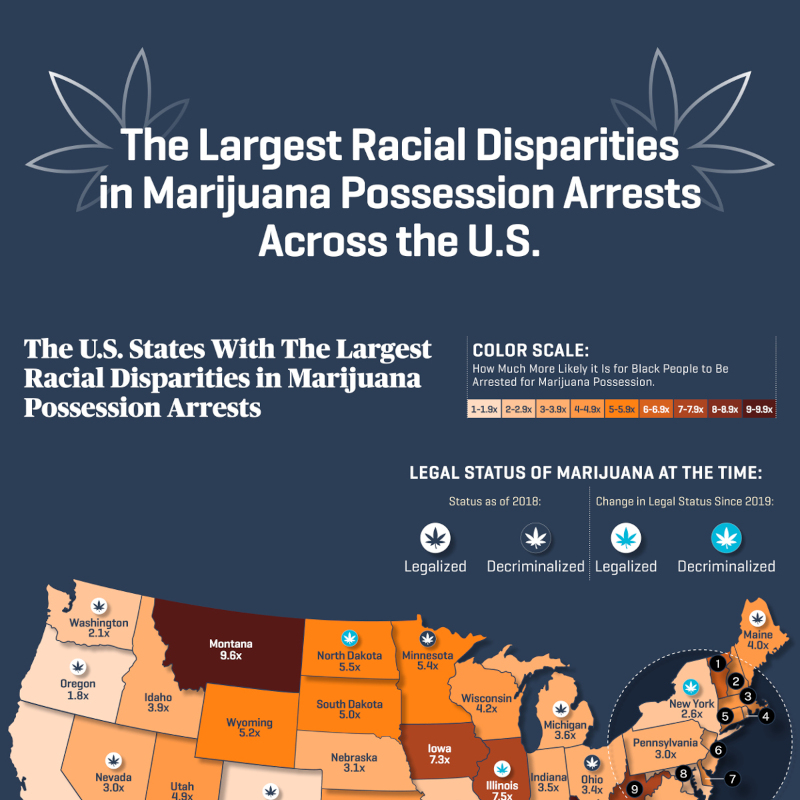The Largest Racial Disparities in Marijuana Possession Arrests Across the U.S.
Where in the United States are black people more likely to be arrested for marijuana possession than white people? Using data from an analysis conducted by the ACLU, we found the 50 counties where racial disparities are the largest when it comes to marijuana arrests. One county in Georgia was found to have an extreme racial disparity in their arrest rates, with black people being 97.2 times more likely to be arrested for possession of marijuana.
Across the 50 states, on average, black people are 3.6 times more likely to be arrested on marijuana charges. This racial disparity has continued to grow over the years as racial profiling among law enforcement has become an increasingly apparent issue. Where has this problem grown the most in the U.S.? We charted out the 20 counties that saw the largest increases in racial disparity in marijuana possession arrests between 2010 and 2018. These huge increases in black arrest rates show how far the United States still needs to go in terms of lessening this racial disparity.
Click to view the full-size infographic
Where Do the Largest Racial Disparities in Marijuana Possession Arrests Occur?
The largest racial disparities in marijuana possession arrests were found in Pickens County, Georgia, where the black arrest rate is a shocking 97.3 times higher than the white arrest rate. While only 321 white people were arrested for marijuana possession, 31,243 black people were arrested for marijuana possession during the same time period. This high arrest rate ratio is more than double that of second-place DeKalb County, Alabama, which had a ratio of 44.6 to 1. In many cases, a strong marijuana defense is critical.
As for which state has the largest racial disparities in marijuana possession arrest rates, the answer is Montana. In Montana, black people are 9.6 times more likely to be arrested for marijuana possession. On the flip side, Colorado was found to have the lowest disparity, as black people there are only 1.5 times more likely to be arrested for marijuana possession.
Which States Have Legalized Recreational Marijuana?
Currently, 11 U.S. states have legalized the recreational use of marijuana. The first states to legalize it were Colorado and Washington back in 2012, with nine other states following their lead since then. All of the states listed below, aside from Illinois, had legalized recreational marijuana by the time this data had been collected.
A few of the states that had already legalized by this point still saw higher likelihoods for black people to be arrested for possession, such as Vermont, which was found to have a ratio of 6.1 to 1. Massachusetts and Maine each had ratios of 4 to 1, even though they had both legalized just two years before.
States Where Recreational Marijuana Is Legal
- Colorado: Legalized in 2012
- Washington: Legalized in 2012
- Oregon: Legalized in 2014
- Alaska: Legalized in 2014
- California: Legalized in 2016
- Nevada: Legalized in 2016
- Maine: Legalized in 2016
- Massachusetts: Legalized in 2016
- Vermont: Legalized 2018
- Michigan: Legalized 2018
- Illinois: Legalized 2019
Which States Have Decriminalized Marijuana?
Thirteen states across the U.S. have decriminalized marijuana. This means that while it’s not considered to be legal and marijuana possession is still a crime, it will no longer result in an arrest, prison time, or a criminal record. The first state to decriminalize marijuana was Ohio back in 1975. Minnesota, North Carolina, and Mississippi followed suit by decriminalizing in 1976, 1977, and 1978 respectively. It would be another 33 years until other states chose to decriminalize, starting with Connecticut in 2011. Even though Minnesota was one of the first states to decriminalize, black people there were still found to be 5.4 times more likely to be arrested for marijuana possession, the highest rate of all of the states where it has been decriminalized.
States Where Marijuana Is Decriminalized
- Ohio: Decriminalized in 1975
- Minnesota: Decriminalized in 1976
- North Carolina: Decriminalized in 1977
- Mississippi: Decriminalized in 1978
- Connecticut: Decriminalized in 2011
- Missouri: Decriminalized in 2014
- Maryland: Decriminalized in 2014
- Delaware: Decriminalized in 2015
- New Hampshire: Decriminalized in 2017
- Hawaii: Decriminalized in 2019
- New Mexico: Decriminalized in 2019
- New York: Decriminalized in 2019
- North Dakota: Decriminalized in 2019
This page was last updated by Brian Joslyn



















